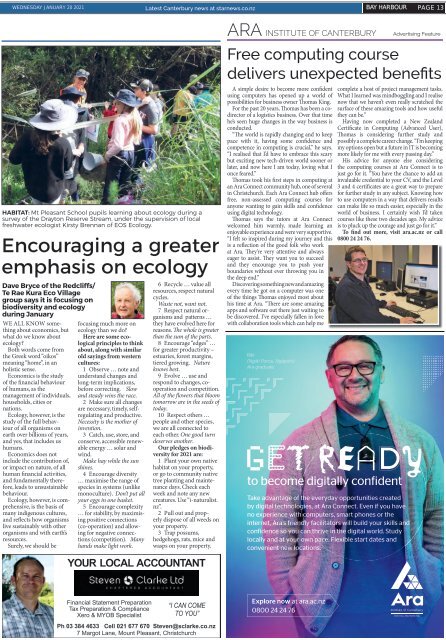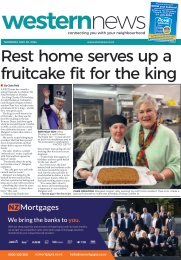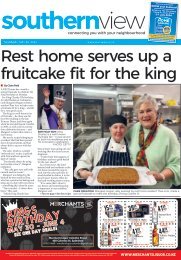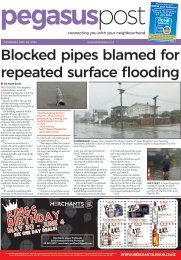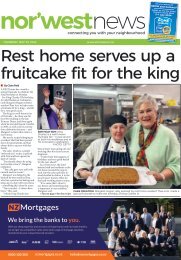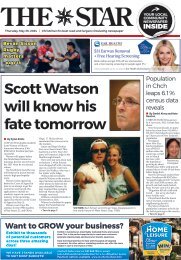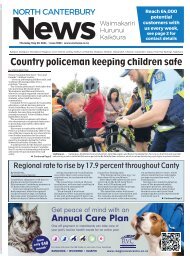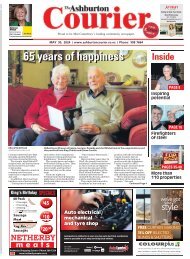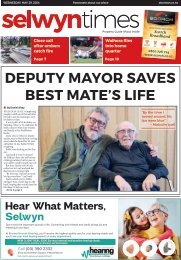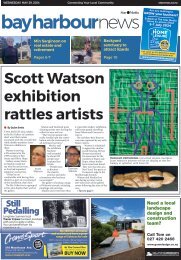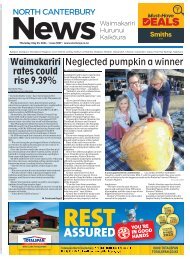Bay Harbour: January 20, 2021
You also want an ePaper? Increase the reach of your titles
YUMPU automatically turns print PDFs into web optimized ePapers that Google loves.
2<br />
Wednesday <strong>January</strong> <strong>20</strong> <strong>20</strong>21<br />
[Edition datE]<br />
Latest Canterbury news at starnews.co.nz<br />
ARA INSTITUTE OF CANTERBURY<br />
BAY HARBOUR<br />
PAGE 13<br />
HABITAT: Mt Pleasant School pupils learning about ecology during a<br />
survey of the Drayton Reserve Stream, under the supervision of local<br />
freshwater ecologist Kirsty Brennan of EOS Ecology.<br />
Encouraging a greater<br />
emphasis on ecology<br />
Dave Bryce of the Redcliffs/<br />
Te Rae Kura Eco Village<br />
group says it is focusing on<br />
biodiversity and ecology<br />
during <strong>January</strong><br />
WE ALL KNOW something<br />
about economics, but<br />
what do we know about<br />
ecology?<br />
Both words come from<br />
the Greek word “oikos”<br />
meaning “home”, in an<br />
holistic sense.<br />
Economics is the study<br />
of the financial behaviour<br />
of humans, as the<br />
management of individuals,<br />
households, cities or<br />
nations.<br />
Ecology, however, is the<br />
study of the full behaviour<br />
of all organisms on<br />
earth over billions of years,<br />
and yes, that includes us<br />
humans.<br />
Economics does not<br />
include the contribution of,<br />
or impact on nature, of all<br />
human financial activities,<br />
and fundamentally therefore,<br />
leads to unsustainable<br />
behaviour.<br />
Ecology, however, is comprehensive,<br />
is the basis of<br />
many indigenous cultures,<br />
and reflects how organisms<br />
live sustainably with other<br />
organisms and with earth’s<br />
resources.<br />
Surely, we should be<br />
focusing much more on<br />
ecology than we do?<br />
Here are some ecological<br />
principles to think<br />
about, along with similar<br />
old sayings from western<br />
cultures:<br />
1 Observe … note and<br />
understand changes and<br />
long-term implications,<br />
before correcting. Slow<br />
and steady wins the race.<br />
2 Make sure all changes<br />
are necessary, timely, selfregulating<br />
and productive.<br />
Necessity is the mother of<br />
invention.<br />
3 Catch, use, store, and<br />
conserve, accessible renewable<br />
energy … solar and<br />
wind.<br />
Make hay while the sun<br />
shines.<br />
4 Encourage diversity<br />
… maximise the range of<br />
species in systems (unlike<br />
monoculture). Don’t put all<br />
your eggs in one basket.<br />
5 Encourage complexity<br />
… for stability, by maximising<br />
positive connections<br />
(co-operation) and allowing<br />
for negative connections<br />
(competition). Many<br />
hands make light work.<br />
6 Recycle … value all<br />
resources, respect natural<br />
cycles.<br />
Waste not, want not.<br />
7 Respect natural organisms<br />
and patterns …<br />
they have evolved here for<br />
reasons. The whole is greater<br />
than the sum of the parts.<br />
8 Encourage “edges” …<br />
for greater productivity –<br />
estuaries, forest margins,<br />
tiered growing. Nature<br />
knows best.<br />
9 Evolve … use and<br />
respond to changes, cooperation<br />
and competition.<br />
All of the flowers that bloom<br />
tomorrow are in the seeds of<br />
today.<br />
10 Respect others …<br />
people and other species,<br />
we are all connected to<br />
each other. One good turn<br />
deserves another.<br />
Our pledges on biodiversity<br />
for <strong>20</strong>21 are:<br />
1 Plant your own native<br />
habitat on your property,<br />
or go to community native<br />
tree planting and maintenance<br />
days. Check each<br />
week and note any new<br />
creatures. Use “i-naturalist.<br />
nz”.<br />
2 Pull out and properly<br />
dispose of all weeds on<br />
your property.<br />
3 Trap possums,<br />
hedgehogs, rats, mice and<br />
wasps on your property.<br />
Free computing course<br />
delivers unexpected benefits<br />
A simple desire to become more confident<br />
using computers has opened up a world of<br />
possibilities for business owner Thomas King.<br />
For the past <strong>20</strong> years, Thomas has been a codirector<br />
of a logistics business. Over that time<br />
he’s seen huge changes in the way business is<br />
conducted.<br />
“The world is rapidly changing and to keep<br />
pace with it, having some confidence and<br />
competence in computing is crucial,” he says.<br />
“I realised that I’d have to embrace this scary<br />
but exciting new tech-driven world sooner or<br />
later, and now here I am today, loving what I<br />
once feared.”<br />
Thomas took his first steps in computing at<br />
an Ara Connect community hub, one of several<br />
in Christchurch. Each Ara Connect hub offers<br />
free, non-assessed computing courses for<br />
anyone wanting to gain skills and confidence<br />
using digital technology.<br />
Thomas says the tutors at Ara Connect<br />
welcomed him warmly, made learning an<br />
enjoyable experience and were very supportive.<br />
“I felt so inspired during my journey and this<br />
is a reflection of the good folk who work<br />
at Ara. They’re very attentive and always<br />
eager to assist. They want you to succeed<br />
and they encourage you to push your<br />
boundaries without ever throwing you in<br />
the deep end.”<br />
Discovering something new and amazing<br />
every time he got on a computer was one<br />
of the things Thomas enjoyed most about<br />
his time at Ara. “There are some amazing<br />
apps and software out there just waiting to<br />
be discovered. I’ve especially fallen in love<br />
with collaboration tools which can help me<br />
complete a host of project management tasks.<br />
What I learned was mindboggling and I realise<br />
now that we haven’t even really scratched the<br />
surface of these amazing tools and how useful<br />
they can be.”<br />
Having now completed a New Zealand<br />
Certificate in Computing (Advanced User),<br />
Thomas is considering further study and<br />
possibly a complete career change. “I’m keeping<br />
my options open but a future in IT is becoming<br />
more likely for me with every passing day.”<br />
His advice for anyone else considering<br />
the computing courses at Ara Connect is to<br />
just go for it. “You have the chance to add an<br />
invaluable credential to your CV, and the Level<br />
3 and 4 certificates are a great way to prepare<br />
for further study in any subject. Knowing how<br />
to use computers in a way that delivers results<br />
can make life so much easier, especially in the<br />
world of business. I certainly wish I’d taken<br />
courses like these two decades ago. My advice<br />
is to pluck up the courage and just go for it.”<br />
To find out more, visit ara.ac.nz or call<br />
0800 24 24 76.<br />
YOUR LOCAL ACCOUNTANT<br />
Financial Statement Preparation<br />
Tax Preparation & Compliance<br />
Xero & MYOB Specialist<br />
“I CAN COME<br />
TO YOU”<br />
Ph 03 384 4633 Cell 021 677 670 Steven@sclarke.co.nz<br />
7 Margot Lane, Mount Pleasant, Christchurch


